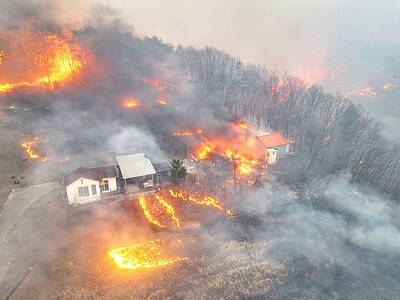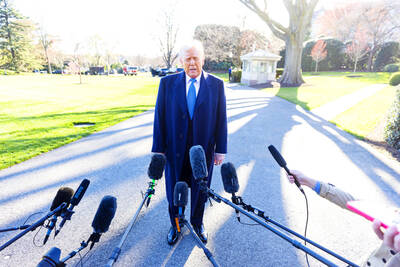This year’s UN General Assembly began with calls for multilateralism and cooperation — a declaration that the urgency for countries to unite “has rarely been greater,” but it concluded on Tuesday with a parade of divisive grievances that echoed when the final gavel fell.
Leader after leader in days of speeches delivered virtually stressed the importance of working together to navigate the COVID-19 outbreak and the challenges that lie beyond it.
As German Minister of Foreign Affairs Heiko Maas said, COVID-19 “shows that international cooperation is neither an ideology nor an end in itself. On the contrary, it delivers results, far beyond the actual pandemic.”

Photo: AFP / UNITED NATIONS / Loey Felipe
However, words are not results.
Although the UN and most of its member states largely envision a multilateral world, the underlying issues and challenges that divide nations sat squarely in the spotlight, as the “right of reply” at the end of the closing session demonstrated vividly.
One by one they came forward — lower-level diplomats tasked with replying to leaders’ speeches with intense responses.
Bangladesh went after Myanmar over the more than 700,000 Rohingya Muslims who fled a crackdown by Myanmar’s military in 2017 and are living in camps in Bangladesh, still fearful of returning home — and Myanmar responded.
Iran went after Israel over the speech by Israeli Prime Minister Benjamin Netanyahu, who said that the Islamic Republic would have “enough enriched uranium in a few months for two nuclear bombs” after it began exceeding limits set by the 2015 nuclear deal with world powers.
An Iranian diplomat accused Israel of disregarding UN resolutions on negotiating a two-state solution with Palestine, and added that Israel “poses the most serious threats to the security of the states in the Middle East” because of its widely reported nuclear program, which Israel has never acknowledged.
The United Arab Emirates (UAE) took the floor over a dispute with Iran over three Iranian-occupied islands that Abu Dhabi claims, and Tehran’s “destabilizing conduct” in the region, including supporting Houthi Shiite rebels in Yemen.
It dismissed Iran’s allegation that the UAE was destabilizing security in the Middle East.
Iran, again asked to reply, insisted on its claim to the islands and accused the UAE of using starvation “as a war tactic in Yemen.”
The UAE intervened for a second time, insisting that the islands are occupied.
A Yemeni diplomat then responded to the Iranian, saying: “How does he dare speak about the situation in Yemen while he is responsible for the situation?”
The Yemeni accused Iran of “continuing their intervention to destabilize my country by providing money, weapons, training and equipment to establish their expansionist plan across the region.”
While all the leaders delivered prerecorded speeches, the diplomats on Tuesday spoke in person, seated behind their country’s nameplate in the vast General Assembly Hall where virus restrictions meant only one representative of each of the 193 UN member nations was allowed.
The main in-person event was a virtual UN Security Council meeting that sparked one of the few real-time exchanges and centered the escalating US confrontation with China.
The clash at the meeting was over responsibility for the COVID-19 pandemic, which saw Russia back Beijing, although the US-China confrontation extends to Taiwan, trade issues and claims in the South China Sea.
China’s UN Mission issued a statement just before midnight protesting US Ambassador to the UN Kelly Craft’s participation in an online event hosted by Taiwan on Monday.
It said that her remarks undermined China’s sovereignty and territorial integrity.
“There is only one China in the world, and Taiwan is an inalienable part of China’s territory,” the mission said.
In his remarks opening the global gathering, UN Secretary-General Antonio Guterres had painted a grim picture of the state of the world: an “epochal” health crisis, economic calamity, threats to human rights and worries of a new “cold war” between the US and China.
Guterres called for global unity, foremost to fight the pandemic, and sharply criticized populism and nationalism as failed answers that often worsened the situation.
UN General Assembly President Volkan Bozkir ended the six-day meeting on an upbeat note, returning to the need for multilateralism and unity.
“The challenges facing us are enormous, but so are the possibilities of solutions,” he said. “By working together, we can overcome them.”

DEATH CONSTANTLY LOOMING: Decades of detention took a major toll on Iwao Hakamada’s mental health, his lawyers describing him as ‘living in a world of fantasy’ A Japanese man wrongly convicted of murder who was the world’s longest-serving death row inmate has been awarded US$1.44 million in compensation, an official said yesterday. The payout represents ¥12,500 (US$83) for each day of the more than four decades that Iwao Hakamada spent in detention, most of it on death row when each day could have been his last. It is a record for compensation of this kind, Japanese media said. The former boxer, now 89, was exonerated last year of a 1966 quadruple murder after a tireless campaign by his sister and others. The case sparked scrutiny of the justice system in

DITCH TACTICS: Kenyan officers were on their way to rescue Haitian police stuck in a ditch suspected to have been deliberately dug by Haitian gang members A Kenyan policeman deployed in Haiti has gone missing after violent gangs attacked a group of officers on a rescue mission, a UN-backed multinational security mission said in a statement yesterday. The Kenyan officers on Tuesday were on their way to rescue Haitian police stuck in a ditch “suspected to have been deliberately dug by gangs,” the statement said, adding that “specialized teams have been deployed” to search for the missing officer. Local media outlets in Haiti reported that the officer had been killed and videos of a lifeless man clothed in Kenyan uniform were shared on social media. Gang violence has left

‘HUMAN NEGLIGENCE’: The fire is believed to have been caused by someone who was visiting an ancestral grave and accidentally started the blaze, the acting president said Deadly wildfires in South Korea worsened overnight, officials said yesterday, as dry, windy weather hampered efforts to contain one of the nation’s worst-ever fire outbreaks. More than a dozen different blazes broke out over the weekend, with Acting South Korean Interior and Safety Minister Ko Ki-dong reporting thousands of hectares burned and four people killed. “The wildfires have so far affected about 14,694 hectares, with damage continuing to grow,” Ko said. The extent of damage would make the fires collectively the third-largest in South Korea’s history. The largest was an April 2000 blaze that scorched 23,913 hectares across the east coast. More than 3,000

‘INCREDIBLY TROUBLESOME’: Hours after a judge questioned the legality of invoking a wartime power to deport immigrants, the president denied signing the proclamation The US on Friday said it was terminating the legal status of hundreds of thousands of immigrants, giving them weeks to leave the country. US President Donald Trump has pledged to carry out the largest deportation campaign in US history and curb immigration, mainly from Latin American nations. The order affects about 532,000 Cubans, Haitians, Nicaraguans and Venezuelans who came to the US under a scheme launched in October 2022 by Trump’s predecessor, Joe Biden, and expanded in January the following year. They would lose their legal protection 30 days after the US Department of Homeland Security’s order is published in the Federal